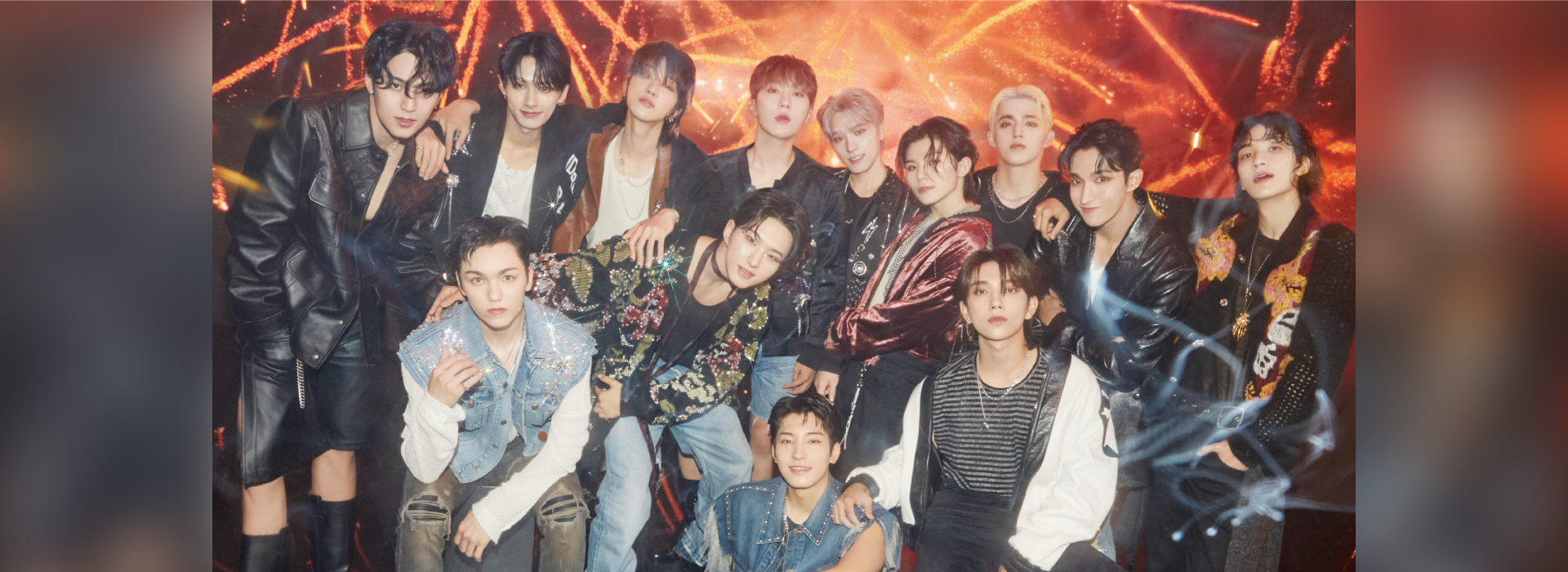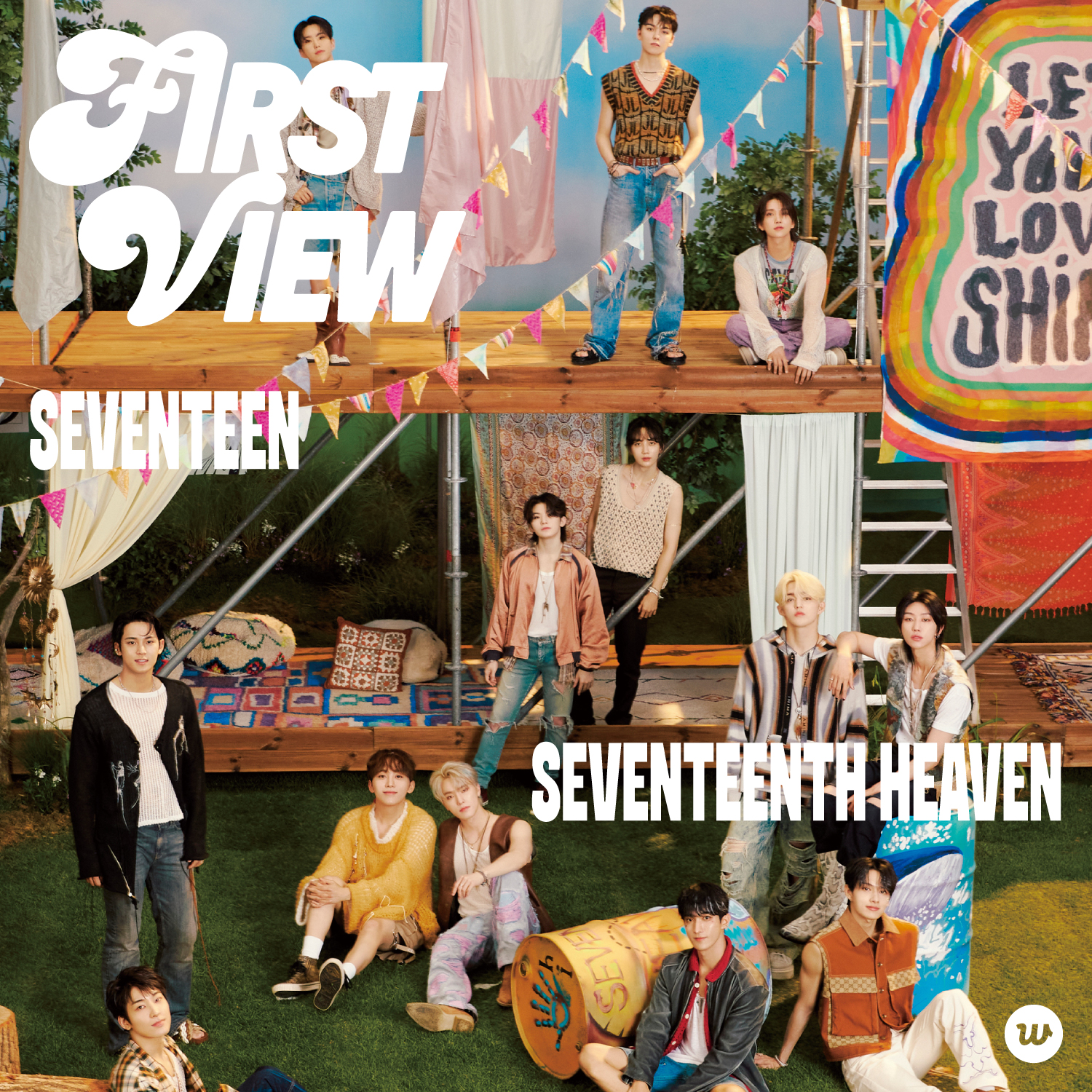
It’s SEVENTEEN’s festival, and you’re invited
Yoon Haein: A place filled with song and passion. The intersection of reality and fantasy. A flash of brilliance that helps people to endure the real world. SEVENTEEN is hosting their own festival with their latest album, SEVENTEENTH HEAVEN. “God of Music,” the lead single, is especially hard-hitting, unleashing all the might the group has. SEVENTEEN members match their movements to the sound and rhythm surrounding them—their attention to detail, down to the most minute hand gesture, serves to bring out “every single note” of the song to the fullest. Despite the ceaseless running, jumping, and dancing, the SEVENTEEN members wear cheerful smiles all throughout the choreography, leveraging their intimate dynamic to draw colorful reactions out of one another that leaves viewers feeling like they are part of the crew themselves. SEVENTEEN makes music that appeals to everyone, but they go beyond making it appealing—they put every last ounce of energy and effort in their bodies into their performance, and they’re not afraid to break a sweat doing it. That’s why the viewer feels an emotional resonance with the “God of Music” choreography that goes beyond the kind of excitement that a complex group dance typically elicits. The song is driven by thrilling brass that channels the uplifting ambience of a festival. The chorus at the heart of the song brings the whole track home, nudging people who’ve “just met” to “dance together.” The simplicity of the phrase “kung chi pak chi” makes it easy enough for anyone to sing along to, and the way the song repeats the chorus amps up the energy so that even people listening with their headphones will be able to picture a roaring crowd singing along. The last time through the chorus, it’s stripped down to just S.COUPS and WONWOO singing as they clap to the beat, but they carry the fun and uplifting energy right through to the end.
If “God of Music” feels like the highest highs of a summer day, “Headliner” is a track that continues to reverberate in the deepest depths of your heart. Each of the SEVENTEEN members’ vocals work together to prop each other up in the chorus (“I’ll sing along to you”), and the line, “You’re my headliner,” sticks around like a lingering echo long after the song ends. But with lines like, “I’ll be in your first row,” the group makes not themselves, but the fans, the centerpiece of the song. Though they’ve made it far enough to be worthy of the title “Headliner”, SEVENTEEN still sings their hearts out as a team and dedicates their songs to the fans. That makes the “Shining Diamond” sampler “Diamond Days” an even more touching tribute. In the track, SEVENTEEN references the promise they made to their fans ahead of their debut, reaffirming that their commitment continues even to this day: “We’re still the same as we were at the start.” That’s coming from a group that’s now in their ninth year. They wanted to shine, and they did; they wanted to turn their light on others, and they did that, too. SEVENTEEN can do it all, from happily cheering people on with a song like “Fighting” (BSS), to showing the full scale of their talent as a testament to their towering stature in sweeping performances like “Super.” They also launched SEVENTEEN STREET in Seongsu, one of the most popular neighborhoods in Seoul, and filled it with their name and everything album-related to promote the then-upcoming release. Events like this bring SEVENTEEN and CARAT together in everyday life, which in turn brings the group’s festival ever closer to reality. Against this backdrop, SEVENTEEN invites more and more people to the festival they are co-hosting with CARAT, mirroring how the “God of Music” brings the true joy of the artform to all. It’s a festive experience that moves everyone who accepts the invitation to sing along and groove to the music. The phrase “seventh heaven,” from where the album derives its title, is an expression describing total and utter happiness. Likewise, SEVENTEEN fills people with wholesome joy and energy. That wholesomeness, of course, encompasses music, happiness, friendship, and love—for SEVENTEEN, and for CARAT.
Heart of the youth
Myeongseok Kang: If you went to capture the essence of youth in song form, it would be from SEVENTEEN. Eight years ago, they released the track “Shining Diamond,” where they gave their fans a “brilliant promise.” Now, on “Diamond Days” off their new album, SEVENTEENTH HEAVEN, they keep to their word: “Without change, my heart’s the same as it was at the start.” The album’s next track, “Back 2 Back,” has the boys describing walking back to back to get through the “cold wind and darkness” as “your tremors almost reach behind me” and “the excitement that has broken through the field of view.” On “SOS” (prod. Marshmello), they show how much they believe in each other by saying “Just shoot the SOS SOS / Please tell me SOS” to a friend who worries and asks, “Tell me, where are we going right now?” Just as they’re tasked with providing answers to the eternal questions surrounding the love and friendship in one’s youth, SEVENTEEN sings with passion, power, and speed without ever looking back over their shoulders. In “SOS,” immediately after asking “where is the love,” they reassure the listener that they “can find the love.” On October 10, SEVENTEEN won the Grand Prize at THE FACT MUSIC AWARDS 2023 and sang “Super” as their encore. Like they sing in “God of Music,” the single off their new album, SEVENTEEN now has the status and the power to get everyone to“dance and sing” so they “feel amazing.” But they still give their all on stage, even taking the unusual step of performing an encore at an awards show. Their passion is evident throughout the song—in their vocals as they stab at every syllable of “kung chi pak chi kung kung chi pak chi” in the chorus, and in their complex choreography that they execute flawlessly with unwavering smiles on their faces. The excitement boils over in the intro, melody, and repeated “kung chi pak chi” in “God of Music,” showing SEVENTEEN still has the energy, power, and pure speed to live up to their title. Though they’ve risen in status all the way to headline awards shows, they still move with the vigor and thumping heartbeat of youth. And we see it again in the transition between, “If there is a God of Music / This is a message for you,” and, “kung chi pak chi” in the chorus: it’s the line “Dance and sing, this feels amazing,” sung with vigor and excitement. It takes serious songwriting skill to make two different melodies flow together so smoothly, and incredible vocal talent to capture that shift while still keeping up the energy, all of which proves that SEVENTEEN is still the energetic young superstars with an impeccable technique who can sell 10 million albums a year.
The melodies unfold rapidly, constantly changing. For example, a trap beat dominates the beginning of “SOS,” then the vocals shift into such rough desperation in the chorus that it borders on emocore. In “Back 2 Back,” the mood changes three times, with the chorus taking on a stormy melody. In all cases, it’s the group members’ technical skill that allows them to keep the songs feeling consistent. It wouldn’t be an exaggeration to say WOOZI has reached a new peak with his producing prowess on this album, crafting melodies that are constantly in flux but giving superb vocal direction to ensure that the members maintain a consistent and cohesive flow of emotions. SEVENTEENTH HEAVEN takes what might be labeled K-melody—the unique brand of melody found among K-pop idols—and upgrades it to give us the best music of 2023. It stands as a testament to why the world needs the unique melodies that only K-pop idols can provide. The genres vary from song to song, each with a melody whose complexity is justified with meticulous arrangements. But at SEVENTEENTH HEAVEN’s core is the tradition of K-pop idols pouring their hearts out in the chorus of each and every song they sing. Even after all these years of making music and gaining more and more fans worldwide, SEVENTEEN retains their signature choruses with moving melodies. To put it another way, the things that make youth what it is have stayed the same. In that sense, SEVENTEENTH HEAVEN ups the stakes in this style we call K-pop—or, more specifically, K-pop boy groups—to new limits.
SEVENTEEN were full of confidence before their debut in “Shining Diamond,” singing, “We’ve been through enough time and pressure, so look close / I’m that Diamond.” And now, eight years later, singing in “Diamond Days,” they look back on that “time and pressure” while “remembering the first days.” Whereas they whispered the words “slip into the diamond life” in “Shining Diamond,” by the time they revisit the same lyrics in “Diamond Days,” they’re singing them loud and clear. But the real highlight of the new song is when they repeatedly sing the words, “Da-Diamond Days Da-Diamond,” turning down the energy and focusing solely on the rhythm. Only a group like SEVENTEEN could ride a rhythmic wave like this, taking what in other hands would be a drop in excitement and turning it to their advantage thanks to their incredible precision and control. There’s no need here to reach the heights of their vocals—they can pull on nostalgic heartstrings just by conjuring up memories of that “Diamond.” Those eight years of “time and pressure” got them the “Diamond” record they deserve. They released 11 mini albums alone in that span of time, including SEVENTEENTH HEAVEN, and performed countless brilliant songs countless times, like “Adore U,” “Fear,” “Fearless,” and “Super.” In so many of their songs, they sing about their lives and what drives them forward: “SOS” is about their lives as members of a famous boy band (“Everyday we’re fightin’”), and “Back 2 Back” shows how the trust between the group’s members is the force that has kept them on track to become a diamond despite all the pressure (“Absolute trust, I’m back to back with you”). Just like how the melody to “Back 2 Back” keeps moving forward and never looks back, SEVENTEEN has proven their solidarity and friendship time and time again, living through the never-ending battle that is the life of K-pop superstars as the limits of their creativity and strength are put to the test. In “God of Music,” SEVENTEEN sings music’s praises in hopes that everyone around the world can enjoy the group’s song and dance—such jubilant exultation feels like a diamond itself, that has been created under the sometimes painful pressures of youth. Once singing that they “don’t know how to give up, I’m running riot,” and that they “can keep running forever more” because they “love my team, I love my crew,” they’ve now ascended to a higher plane and are here to bring happiness to the world.
In “Headliner,” SEVENTEEN roots for someone else that they want to see become a headliner (“Even if it rains again, I’ll be in your first row”). SEVENTEEN has already become a headliner in every sense of the word, but now they sing for everyone who’s listening to their music (“You’re my headliner”). After all, they experienced a miracle: Just like they sing in “Monster” (“bottom to the top star”), the group had humble beginnings, singing and dancing in a small practice studio, streaming on the Internet to promote themselves. Behind all that success were surely hard times that they weren’t so quick to reveal. But now, having truly come from the “bottom to the top star,” they turn the tables and sing their love out for all their listeners—the true headliners in their hearts. This is a group of idols who were streaming themselves singing and dancing to promote themselves even before debuting, who then went on to have the best album sales in K-pop history, and now they’re singing about how their listeners are the real headliners. That’s the kind of underdog story you don’t get even in the best work of fiction. And here’s SEVENTEEN, doing it for real. The performance unit shows how they have a friendship and faith in one another strong enough to get them through this challenging world in “Back 2 Back”; the hip hop unit flexes their popularity in a way that’s far from condescending but border on being “cute” on the track “Monster” (“I live like a pop star now / If you don’t believe me, come see my concert”); the vocal unit humbly confesses their true feelings in “Yawn.” So, while the first three tracks off the album explore how proud they are to be in their “Diamond Days,” the willpower it takes to push through all kinds of hardship with friends (“I’ll be waiting here cuz I’m your friend,” “SOS”), and the artist’s role when it comes to making people happy by summoning the “God of Music,” the three unit songs that follow reveal how, behind the glamorous facade of K-pop superstars, they’re still, ultimately, young and sensitive men. They’d like to brag a bit about their well-earned popularity, of course, but they nonetheless forever stick with the friends who have always been by their side, and never cease trying to convey their true feelings. This is perhaps why even though the centerpiece of the album is a chorus of youthful voices shouting out into the world, “Yawn” and “Headliner,” two tracks dedicated to “you,” keep low and calm. The boys are all grown up and successful now. They already have more fame and fortune than they know what to do with. But they keep running forward, together, never looking back—making it through the “cold wind and darkness” of the world with the power of undying friendship and innocent love. That’s just the kind of idols they are.


Unauthorized reproduction and distribution prohibited.
- SEVENTEEN’s Playlist2023.05.09



